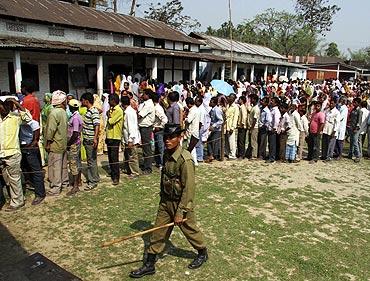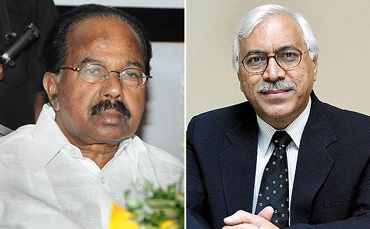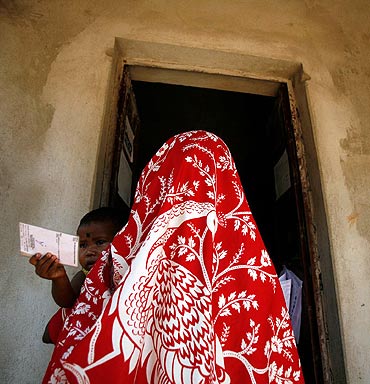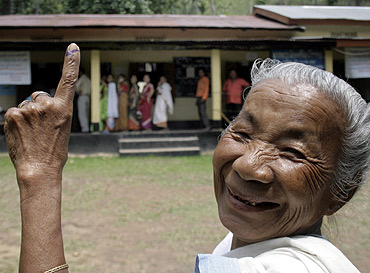 | « Back to article | Print this article |
'Electoral reforms no less important than Lokpal Bill'
The Election Commission and the Law Ministry have joined hands to draw up a list of electoral reforms that seek to bar corrupt and criminal leaders from contesting polls, says Sheela Bhatt
It's a big surprise that the government has not made enough noise about what Law Minister Verappa Moily has been doing since the last six months.
Moily and Chief Election Commissioner Dr S Y Quraishi have held conferences all over India to get the civil society's views on electoral reforms, which are by all standards as important as the Lokpal Bill, the CEC had said in an earlier interview.
While talking exclusively to Rediff.com on the proposed electoral reforms, Dr Quraishi said, "Along with the law ministry, we co-sponsored seven regional consultations followed by a national consultation. In these seminars, we took up all the electoral reforms which have been proposed by us, plus all other reforms which have been put forward by others. And the very fact that six conferences have already taken place speaks for itself. We have visited Bhopal, Lucknow, Kolkata, Chandigarh, Mumbai and Bengaluru (to hold these conferences). Only the conference in Guwahati is remaining and that will be held soon."
Explaining the background of the conference, the CEC said, "Mr Veerappa Moily called up to congratulate me when I took over. I reminded him about the pending issues. He assured me that he'll take it up on the fast-track. He lived up to his promise. He came with his entire team to the Election Commission in September 2010. We had a three-and- half-hour long meeting. And then we decided that we will make efforts to know the views of civil society on electoral reforms."
'The entry of corrupt people has to be stopped'
However, it is no surprise that even electoral reforms have to wait in India when the national team is playing in the cricket World Cup final.
After a series of conferences, a national level meeting had been scheduled on April 2. Though Prime Minister Manmohan Singh had finalised the date, the meeting got postponed because of the World Cup final on the same day. The CEC realised that nobody would come for the meeting.
According to Quraishi, the meeting will be held as soon as the assembly elections get over on May 13. The proposal about electoral reforms will be put before the national parties in this meeting.
When asked about the major electoral reforms on his agenda, CEC Quraishi explained, "Basically there are seven reforms we are asking for. But the two most important issues are how to stop criminals from entering the electoral fray and how to make election funding transparent. I think these two issues are very basic reforms. When the nation is talking about corruption, which is surely a big issue, we have to think about electoral reforms first."
The CEC argued that the Lokpal Bill is very necessary to prosecute the corrupt leader, electoral reforms are needed to prevent them from coming to power.
He added, "The entry of corrupt people in politics, Parliament and assemblies has to be stopped. Someone who has spent Rs 2 crore in fighting elections, much beyond the permitted limit, will surely try to earn ten times more once elected. He will try to recover and repay the cost. This is how corruption begins."
'Donations to all political parties should be transparent'
Added the CEC, "From personal account, we know that very few candidates are following the expenditure ceiling fixed by law. Whether to increase the ceiling or not is a debatable issue. If we remove the ceiling on expenditure, only the rich candidates will be able to fight elections. If we increase it, the poor candidates will have no chance. So, ideally there should be a reasonable ceiling on expenditure and it should be disciplined by political parties themselves. They should not put up any candidate who has criminal charges pending against them."
Among the arguments made before CEC, one was that since political parties kept filing cases against each other, even an innocent candidate may get barred.
So in 2001, the law commission came up with a formulation that directed the EC to ignore minor cases. But cases which will lead to a conviction of five or more years like rape, dacoity, murder and kidnapping should not be ignored, the commission suggested.
Quraishi said, "In such cases, where the court of law has framed charges, we should not allow the accused to contest. In our conferences on electoral reforms, we have received inputs from civil society, which we record and add to our notes. For the EC and the law ministry, taking steps to stop criminalisation of politics is number one on the agenda.
"Secondly, on the issue of political funding, we are insisting that donations to all political parties should be transparent and should be made by cheques. The accounts of political parties must be approved by auditors who are backed by the comptroller and auditor general of India. Both these reform proposals are opposed by political parties," he said.
'Law breakers become law makers'
It is important to note that competition breeds corruption, said Quraishi.
He expressed regret that, "Here is a situation where law breakers become law makers. My own feeling is that whether it's the issue of criminalisation of politics or funding of election, it's a competitive phenomenon. If one party puts up a dacoit the other party finds it difficult to stand up to him. So, they find out a bigger criminal with winning ability. If a rich man is contesting the polls, he will have an advantage. So the other party, voluntarily or otherwise, will find a candidate with matching money power."
The CEC pointed out that in India, all candidates are asked certain details like his/her income, social background, criminal records etc at the time of filing of the affidavit. This helps the voters know more about their candidates, said Quraishi.
"We have improved the process of filing of affidavits. We immediately put it up in a public domain. The returning officer accepts the affidavit and sends it to the deputy election officer and the chief election officer to put it up on the EC's website. All this information on the candidate's criminal, financial, political and educational background is passed on to the Association of Democratic Reforms. The ADR is a group of 1,200 non-government organisations working for national causes. Out of our data, they conduct their own analysis and educate the people via the media," he said.
'We check poll expenditure of all candidates'
All these affidavits are also sent to the revenue department, informed the CEC.
"We want the income tax department to cross-check the information. Earlier, once the elections were over, we had no role to play. But now we follow up to check the expenditure of all candidates. We want to see how many of these affidavits were correct. We pass on the information to the income tax department. Under the law, our returning officer is not entitled to examine the affidavits filed by the candidate. He can only say whether the affidavit is complete or not complete. He cannot reject it if it's properly filed. He can't go into the veracity of the facts filed," he said.
Quraishi says that if someone finds the hidden property of candidates and proves that the information about it has been suppressed, then the issue can be raised by filing a petition with the EC. Providing false information in an affidavit is punishable under the law.
Quraishi insists that his office is "very serious" about these reforms. He claims that no other government has taken this kind of initiative to acquaint itself with the civil society's views on electoral reforms.
All the six conferences were attended by CEC Quraishi and Moily.
The issues will crystallise once the national conference, headed by the PM, takes place. Some reforms may even require constitutional amendments. The proverbial ball will then be in the court of the law ministry, which will push for the electoral reforms.




